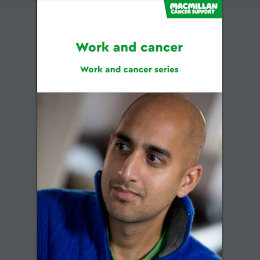Top 10 Tips: Supporting people with work
On this page
-
1. Understanding the significance of work for people living with cancer
-
2. Supporting equality in the workplace for people living with cancer
-
3. Using Fit Notes to guide discussions
-
4. Communicating with managers
-
5. Using Fit Note comments box
-
6. Access to Work schemes
-
7. Signposting Macmillan’s Work Support Service
-
8. Providing advice within your own competencies
-
9. Cancer care reviews and work-related discussions
-
10. Resources for discussing work with people living with cancer
-
About our information
-
For your patients
1. Understanding the significance of work for people living with cancer
Related pages
Booklets and resources
2. Supporting equality in the workplace for people living with cancer
3. Using Fit Notes to guide discussions
4. Communicating with managers
5. Using Fit Note comments box
6. Access to Work schemes
7. Signposting Macmillan’s Work Support Service
Signpost patients to Macmillan’s Work Support Service, available Monday-Friday, 8am-6pm on 0808 808 00 00. This supports people with talking to employers, as well as negotiating adjustments, sick pay and taking time off. It can also refer those with more complex needs to one-off legal advice.
8. Providing advice within your own competencies
9. Cancer care reviews and work-related discussions
10. Resources for discussing work with people living with cancer
About our information
Next planned review: January 2025
We make every effort to ensure the information in these pages is accurate and correct at the date of publication, but it is of necessity of a brief and general nature, and this should not replace your own good clinical judgement. Or be regarded as a substitute for taking professional advice in appropriate circumstances. In particular check any drug doses, side-effects and interactions. Save insofar as any such liability cannot be excluded at law, we do not accept any liability in relation to the use of or reliance on any information contained in on this page, or third-party information or websites referred to in them.





